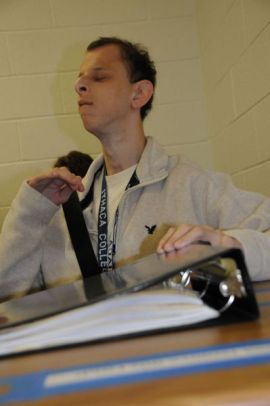As Ryan Silveira begins to play a 19th century Italian Neapolitan classic, “Torna a Surriento,” he cracks a smile and a look of ease passes over his face. His fingers dance across the piano keys, while his powerful tenor voice fills a small practice room in the James J. Whalen Center for Music.

The freshman music education major enjoys the chance to practice his skills. Silveira, who is blind, is not only ambitious and outgoing but is also a gifted musician who possesses perfect pitch.
Perfect pitch, also known as absolute pitch, is the ability to correctly recall or identify any pitch without the aid of an instrument or voice. Silveira said he hears pitches in his mind as if an instrument were playing the exact note. Not only can he identify the pitch of a voice or instrument but also the pitches of objects emitting sound.
“Sometimes things make weird noises,” he said. “If a light is buzzing, for example, I can usually tell you what pitch it’s buzzing on. My micro-fridge is kind of weird, but there’s a B flat in there somewhere.”
Perfect pitch, a trait instilled from birth, is considered a rarity. Only about one in 10,000 people in the United States possess the gift, according to the Grove Dictionary, an encyclopedic dictionary of music and musicians.
John W. White, associate professor of music theory, history and composition, said there are numerous students with perfect pitch at the college because of the high density of exceptional music students admitted.
White, who teaches Silveira’s introduction to musical styles course, said that Silveira is an intelligent student whose musical talents exceed his given ability.
“Not only does perfect pitch aid his understanding of pitch and key design in any given piece he listens to, he has demonstrated a keen sensitivity to timbre and other important aspects of musical design,” White said.
Blind since birth, Silveira has not let his disability interfere with his pursuit of music. He reads music by using a contracted form of Braille, made up of Braille letters and symbols that denote time and key signature, which are types of notes and pitch.
Silveira said he learned to read Braille music at the age of 6, around the same time he was learning to read.
“I remember learning how to read music and that it was confusing, but I was still learning to read at that point, just as most children were,” he said.
Janet Galvan, professor of music education, conducts the Ithaca College Chorus, of which Silveira is a member. Galvan said Silveira helps his fellow students just as much as they help him.
“While students help Ryan with movement [in chorus], he certainly helps them with his superb sense of pitch,” she said.
Silveira developed an interest in music when he was 5 years old, first taking piano lessons and then continuing his study of music through high school. During his first year of chorus in high school, he was selected as part of Connecticut’s All-State Choir, the first freshman from his high school to be selected in nearly 20 years.
Silveira said his high school choir teacher inspired him to follow his dreams of one day becoming a college-level choir director.
“My freshman year, I told my choir director, ‘I really want to become a choir director. I really want a doctorate,’” he said. “She was so excited. I’ve stuck to that goal ever since.”
Silveira’s most recent achievements include gaining a solo in the piece “Imbakwa” performed during the School of Music’s annual Choral Collage on Sept. 28.
Galvan said Silveira’s talent and determination throughout his audition left her with a lasting impression.
“I was very touched by his apparent joy when he sings,” she said. “He sings from the heart, and that always moves me.”
Silveira said his talent and ambition would mean nothing without his love for music.
“I cannot and will not do anything else,” he said. “Music became what I did, not just my hobby. I am one of those people who can and will eat, sleep and breathe music.”




